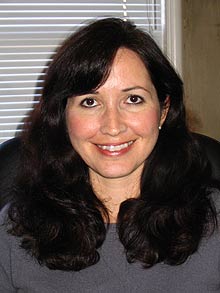Berkeleyan
Fellowships in hand, five postdocs pursue varied research interests
Program to foster academic diversity is accepting applications
![]()
| 04 November 2004
In the late 19th century, anthropologists and museums viewed American Indians as a vanishing race and undertook systematic collection of material (and even human) remains of their culture. To this day, that idea informs many museum exhibitions — and thus feeds popular misconceptions of American Indian nations as extinct, says Amy Lonetree, a postdoc at the Phoebe Hearst Museum of Anthropology.
 Amy Lonetree researches the relationships between museums and American Indians. |
With her fellowship, Lonetree is examining the tribal-museum connection through case studies looking at the British Museum, the Smithsonian’s National Museum of the American Indian, and the Mille Lacs Indian Museum. The latter is a tribal museum in Onamia, Minn., whose exhibitions emphasize the Mille Lacs’ 20th-century experience. The museum offers excellent presentations, she says, on tribal sovereignty, the preservation of the tribe’s native language, and its ongoing strategies to make a living, including its gaming enterprise. With her two-year fellowship, Lonetree will also serve as editor of a special edition of the American Indian Quarterly and will work with staff at the Hearst Museum in an important new collaboration with California tribes.
Five postdoc fellows in residence
The Chancellor’s Postdoctoral Fellowship Program solicits applications from individuals who are committed to careers in university research and teaching, and whose life experience, research, or employment background will contribute significantly to academic diversity and excellence at the Berkeley campus.
“Diversification of the faculty is an urgent campus goal,” says Associate Vice Provost for Faculty Equity Angelica Stacy, who oversees the chancellor’s postdoctoral fellowships. “This program provides an excellent opportunity for departments to assist in furthering this goal by nominating candidates who show promise for tenure-track appointments.”
Currently, four individuals, in addition to Lonetree, hold Chancellor’s Postdoctoral Fellowships. The fellows, their home department at Berkeley, and their research interests are as follows:
• Marlon Kuntze (psychology) is an American Sign Language speaker who became literate through the use of ASL. Working with deaf children, he seeks to explain how some deaf children read and write well without first having access to the phonology of English;
• Michael Cohen (American Studies) is exploring the meaning of conspiracy in American history, beginning in the late 19th century, and the ways that it has been central to the “ideology and political practices of both the rulers and the ruled”;
• Candace Johnson (music) is a singer and former Ms. Black Tennessee. She’ll be on campus beginning in January to explore the impact and dynamics of African American classical music teachers in colleges and universities;
• Reina Maruyama (physics) grew up in Japan and the United States. She is conducting research on fundamental interactions between electrons and atomic nuclei, with the goal of improving our understanding of weak interactions, one of the four basic ways that fundamental particles interact with each other (the other three being gravity, electromagnetism, and strong interactions).
Application details
Application materials — which include a curriculum vitae, a research proposal, and three letters of reference — should be sent to the Chancellor’s Postdoctoral Fellowship Program for Academic Diversity, Office of the Chancellor/FEA, 200 California Hall, UC Berkeley, Berkeley, CA 94720-1500 — postmarked by Friday, Nov. 26. Awards will be announced in early February. For information, see fea.chance.berkeley.edu/Postdoctoral.cfm, e-mail the Faculty Equity Office at fea_info@berkeley.edu, or call 642-1935.

